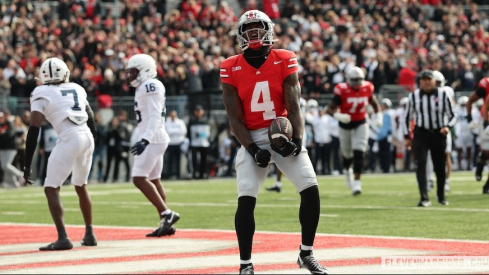In the long dark tea-time of the offseason, we stare wistfully out windows, sighing as we watch the days slowly drip by like so many beads of rain crawling down the outside of a bus to nowhere. Where is it taking us? Slowly, inevitably towards signing day. But that is an eternity away. In the here and now, we are frozen in time.
But not everyone has the offseason blues like you and I do. Some of America's hardest working collegiate sports bureaucrats are busting their asses to come up with new rules and bylaws that govern a sport already totally lousy with them.
Some of them you might've already heard about. For instance, Jim Harbaugh's bomb-ass team trips to the Alkali Flats, where he can yell at them in the pristine expanse of the White Sand National Monument, are suddenly in danger. A potential December early signing period looks like it's in play as well, which should be good news for coaches that pretend to like the circus that is recruiting but in fact want to see the whole thing go down in flames.
But as fun as both of those ideas are, the NCAA D-I Council is making other moves in their winter meetings, according to USA Today's Dan Wolken.
D-1 council is recommending a mandatory 14-week football season. In other words, everyone will get two bye weeks.
— Dan Wolken (@DanWolken) January 18, 2017
Cautious woo? Here's the thing: this is unquestionably a good thing for the overall health of players. An extra week gives them extremely valuable time to recover, rehab, and get checked out for any chronic injuries like concussions or whatnot.
A second bye week would give players more rest and more time to recover from injuries during the season. Unless teams agreed to having less preparation time for bowl games, it would also probably mean games would start a week earlier, which many fans would favor.
It's also good for the NCAA and anyone broadcasting their football games, because while this won't actually add any games to the schedule (yet, and I'll get to that in a second), it'll still create an extra weekend of football for channels to sell ads and for me to live vicariously through the actions of college athletes who are getting younger and younger than me on a yearly basis, which in of itself is extremely frustrating.
And while I don't deny any of that, I'm not quite as high on this proposal as some others might be, mainly because of what happened when the NCAA approved an extra week of football way back in 2005.
Division I-A teams currently play 11 regular-season games, except in years when there are 14 Saturdays from the first permissible playing date through the last playing date in November.
Teams were allowed to play 12 games in the 2002 and 2003 seasons, but until the N.C.A.A. legislation was approved by the board yesterday, they would not have been able to play 12 games again for several years.
...
The Knight Foundation Commission on Intercollegiate Athletics came out against a 12th regular-season game before the board vote, as did the Coalition on Intercollegiate Athletics, an alliance of faculty senates at major universities.
What's interesting about this to me is that the major controversy at the time was about classroom time and how more football would impact the ability of players to embody the near-mythical ideal of the "student-athlete."
At the time, the NCAA assured people that it wouldn't impact these students who happen to play football; hell, it was just a simple matter of eliminating a bye week, what's the harm in that? Can't we balance their athletic and academic lives while also putting on a good show?
In truth, that has always been one of the greatest distractions when it comes to oversight of college football. It's not that players don't deserve the opportunity to go to class and enjoy life as a student, but it's more that the surest way to accomplish this is to make sure that their brains stay in working order.
Which takes us back to the present day. Again, while I agree that adding an additional week to the football season will help reduce the amount of amorphous goo that your average offensive lineman's brain liquefies into over the course of a season, an even better way to accomplish this would be to eliminate the game that was created in 2005.
But that would require the NCAA to reverse a trend of adding more football games to the schedule on a semi-regular basis in the same way that it has for the past five decades.
For example, in the 1960s, Ohio State averaged a hair over nine games played per season. That jumped up to about 11.5 games in the 70s, nearly 12 in the 80s, a little over 12 in the 90s, 12.7 in the 00s, and so far in the 2010s they've averaged over 13 per season (which, of course, includes the 2012 postseason ban).
What's concerning about this is that there's nothing that prevents that proposed second bye from becoming an out of conference game a few years in the future should consumer demand dictate it. If the health of the players is truly a driving force behind the kinds of decisions that the NCAA is making regarding scheduling, the best way to prove their mettle is to choose safety over ratings and eliminate a game.
In 1905, Ohio State played its first ever 12 game season, as coach Edwin Sweetland led them to second place in the Ohio Athletic Conference. The Buckeyes didn't play 12 games in a single season after that until 1974. In 2002, Ohio State played in its first ever 14 game season. It took just over a decade to beat that record.
As the popularity of college football grows, especially in relation to the NFL, the NCAA is going to be tempted by fans and advertising dollars to emulate The League in how they do things. For the sake of the safety of their student-athletes, they should resist that urge.


